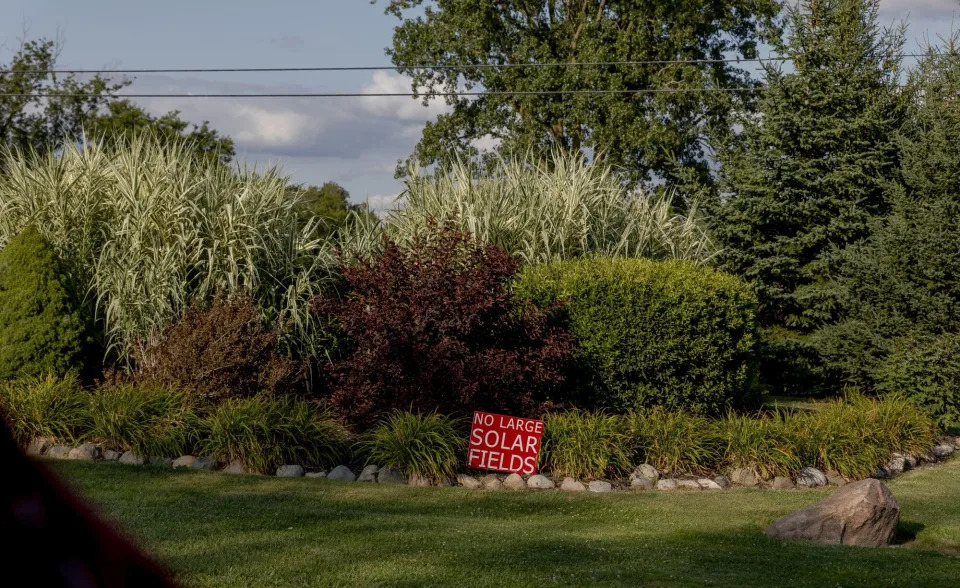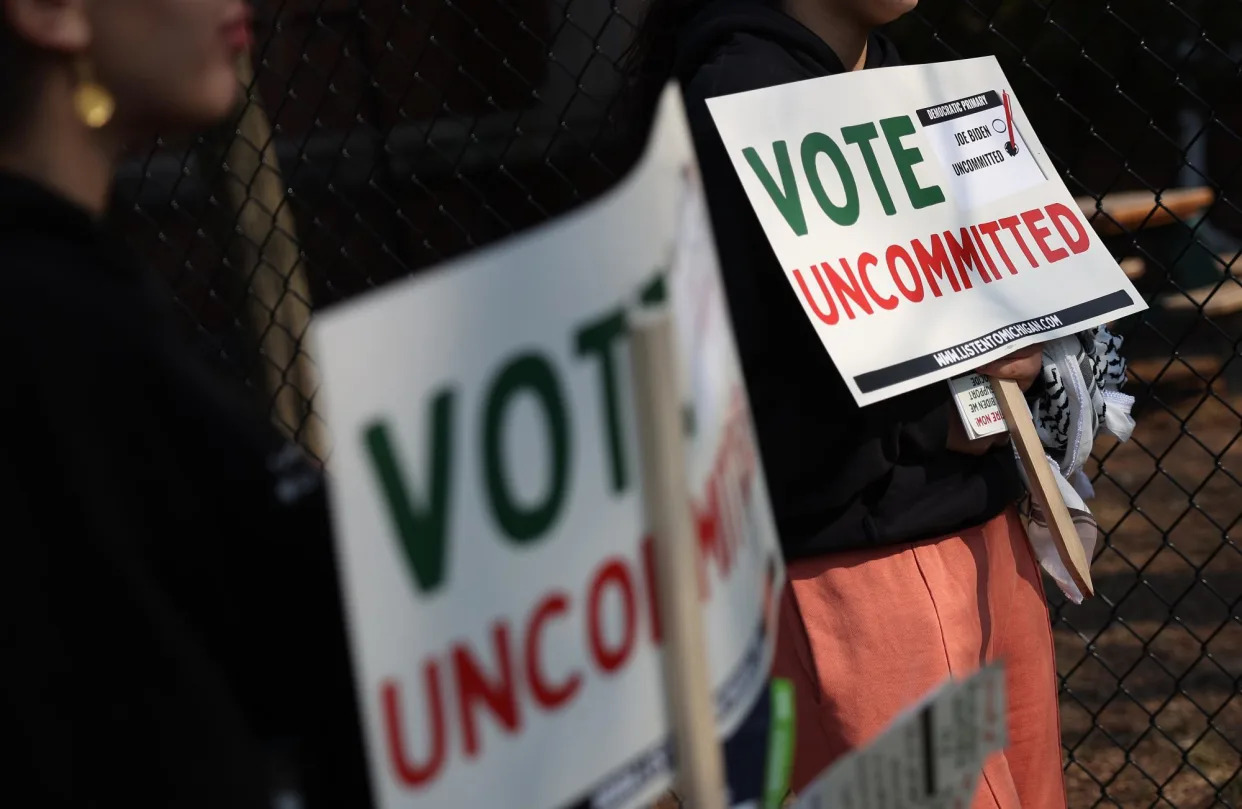Midwestern Farmers Who Say Yes to Solar Power Face Neighbors’ Wrath
Drew Hutchinson and Daniel Moore
Thu, Aug 1, 2024
(Bloomberg) -- When Michigan farmer Clara Ostrander heard about the benefits of hosting a solar energy project, she remembered something her father had told her four days before he died: Don’t sell the farm. Keep it in the family.
Skeptical at first, Ostrander ultimately decided that harvesting the sun on most of her 120-acre corn-and-soybeans farm south of Detroit would enable her to someday pass the land to her son.
But the project proposed by Virginia-based Apex Clean Energy faced fierce opposition from neighbors who feared lower property values, the spoiling of farmland, and an end to the picturesque views that defined their community. They lobbied township officials for zoning rules to block it.
Ostrander and other neighbors fought back, convincing Michigan lawmakers last year to enact a statewide permitting law that usurps local authority to stop such large-scale plans. “We’re trying to do exactly what our forefathers did, and keep our property they worked so hard for,” said Ostrander.
As renewable energy proposals have flooded the flat, sunny and windy sweeps of Midwest farmland, they have sharply divided tight-knit rural communities.
Nationwide, opponents had used 395 local ordinances like the one in Ostrander’s township to halt green energy projects in 41 states by May 2023, according to a study by Columbia Law School’s Sabin Center for Climate Change Law. Even Michigan’s new state law, which takes effect this fall, is not sure to last. Opponents claim the legislation is an affront to the democratic process and are aiming for a referendum to return those decisions to the local level.
“We have deliberately kept the value of farm ground low,” said Kevon Martis, who leads the ballot initiative group, called Citizens for Local Choice. “It’s laying there cheap, and it’s a perfect target for high land-use-intensity developments like wind and solar. I just think that’s fundamentally wrong.”
Martis, a county commissioner, has been an organizer and outspoken critic against wind and solar projects in Michigan and elsewhere for more than a decade. Only in recent years have longtime family farmers like Ostrander, who named one of her goats Solar, emerged as unexpected Yes-in-My-Backyard supporters on the other side, lending developers political capital to get proposals over the finish line.
When township meetings draw a crowd, it’s traditionally been “the people who want to stop something,” said Matthew B. Eisenson, a senior fellow at Columbia’s Sabin Center, which has dispatched staffers to represent pro-energy farmers for free at the local level. If the supportive landowners don’t chime in, he said, “the impression on the siting board might be that it’s the developer versus the community — when in fact that’s not what’s going on.”
Scramble for sites
The Biden administration’s goal of net-zero emissions from the power sector by 2035, as well as state requirements on clean energy standards, have accelerated the scramble to find sites for a sea of upward-facing panels or spinning turbines. The renewable energy industry has reached nearly $130 billion, according to BloombergNEF.
Local zoning restrictions have increasingly been a thorn in its side. That’s prompted some states to act, particularly those where Democrats control both the governor’s mansion and the state legislature.
In one such state, Illinois, Governor JB Pritzker signed a law in 2023 barring local governments from vetoing renewable energy projects, so long as those projects met state standards. Wisconsin and Minnesota have had state siting authority for a decade, but Minnesota, where Democrats also hold the state government trifecta, further cut regulatory requirements for renewable energy projects over the past two years.
The renewable projects are “important at a statewide level, not just at a local level,” said Dan Scripps, chair of the Michigan Public Service Commission. “And that is reflected in terms of having the state have a role in the process, if ultimately it gets bogged down at the local level.”
Developers typically need five to 10 acres for every megawatt of solar capacity, according to the Solar Energy Industries Association. In Michigan, the average project is estimated to generate 158 megawatts, which means it could require at least 790 acres.
So while a 10-acre solar farm might not have a huge impact on views or taxes, one that spans 600 football fields is large enough to generate significant positive and negative reaction — such as more tax revenue but also more sound pollution — within communities, said Sarah Mills, director of the Center for EmPowering Communities in the University of Michigan’s Graham Sustainability Institute.
Consider White River Township. With its rolling hills and waterfront vistas of Lake Michigan, the town 50 miles northwest of Grand Rapids draws people specifically looking to commune with nature. Now residents, including many who lean Democratic and support renewable energy, are trying to accept that their views will soon include 1,700 acres of dark blue solar panels.
Sacrificing nearly one-fifth of the township’s total area is “heartbreaking,” said Mary Jo Ernst, a caretaker and artist whose family has lived in the area for 85 years.
Her neighbor, Shelly Grattafiori, said she and her husband put about $300,000 into renovating what they thought would be their “forever home” in White River. Instead, they’re considering selling before the solar farm takes root.
But with the state in charge of approving projects, moving anywhere in Michigan is a gamble, the women agreed. “With this new law, where do you go?” Ernst wondered.
The Michigan Farm Bureau, as well as statewide associations representing counties and bureaus, assailed the law as an overreach, even undemocratic.
“In my district, the people of Decatur spoke loudly and clearly when they shot down a solar ordinance” with 80% voting against it, State Representative Pauline Wendzel, a Republican, said after the bill was introduced last fall. “Now with this legislation, Democrats are telling Michigan residents that elections don’t matter, and their voices don’t count.”
Change in the neighborhood
Apex Clean Energy arrived in 2020 in Ostrander’s community of Milan Township, about 40 miles from Detroit. At the time, the company was in the midst of the kind of meteoric growth reflected by the industry as a whole.
The size of its staff was surging — it’s tripled to 450 people in the last five years — and its portfolio was, too. Today, Apex operates 30 clean energy sites generating eight gigawatts, enough capacity to power more than 3 million average American homes. Projects under development in Michigan range from a 50-megawatt solar farm in the southwest to a 375-megawatt wind farm farther north.
“Those farmer voices really do matter in moving projects forward,” said Brian O’Shea, public engagement manager at Apex.
Ostrander, 57, is a lifelong resident of Milan Township and a past winner of Homemaker of the Year at the Monroe County Fair. After inheriting her family’s farm, she leases most of it to a local corn and bean farmer. But she also tends 35 goats and two horses and harvests 15 acres with her husband and a small crew.
Times have changed since the proceeds from the Ostrander family harvest was enough to put her and her sister through college. These days agricultural or commodity farming alone often can’t pay the bills — for the farmers or their communities, which need the tax revenue to cover basic services, she said.
Ostrander and her husband, Leonard, both have costly medical issues and just got a $473 bill for a CT scan. Renting her land just for corn and soybeans wasn’t going to cover her rising tax payments, let alone the work needed on two century-old homes she inherited, she said.
In 2022, she leased 100 acres to Apex to help build out Azalia Solar, which would generate enough electricity to power 26,000 homes, according to the developer’s website.
Ostrander declined to discuss details of the arrangement. More than half of large farmers nationally say they have been offered $1,000 per acre each year for solar leases, up from the roughly $750 per acre reported in 2021, according to a Purdue University study released in March.
Kevin Heath, Ostrander’s longtime neighbor and friend whose family owns swaths of land in the township, agreed to lease all 500 of his acres to Apex the same year. Heath figured that, compared to a residential housing project, solar is a lower-impact development that actually protects farmland. If he were motivated only by money, he said, he could sell to an out-of-state agriculture investment company for up to $7,000 an acre.
“If we wanted to be greedy, we could all sit right now in a pile of money,” Heath said.
The pushback from opponents in the 3,534-person township was intense. Heath said he could feel the contempt from people he had built decks for, gone to church with and known since kindergarten.
“Normally I would swing by and say ‘Hi’ if I’m going around the block,” Heath said one July afternoon, after driving through the neighborhood in his Ford pickup with his pitbull terrier, Bunny. “Not anymore.”
Heath, Ostrander and their allies soon confronted a reality: They were relatively large landowners, but outnumbered. Opponents launched recall elections and voted out two planning commissioners seen as pro-solar. In came board members who supported an ordinance banning solar on agricultural land.
Heath’s brother, Phil, had served for 14 years as Milan Township’s supervisor, an elected position that functions as the township manager and chief administrator. Days after a heated board meeting over the issue in October 2022, Phil Heath died of a heart attack.
He had struggled with health issues for years, his siblings said. Still, they are convinced that the stress from all the fighting accelerated his decline.
Kevin Heath now attributes his own high blood pressure to the renewables fight.
“I thought I was going to lose two brothers,” said their sister, Teresa Himes.
About 115 miles northwest, in Pine Township, Dick Farnsworth signed a wind energy lease in 2021 on his 316-acre property that would fund the preservation of century-old family homes, barns and other buildings on the farm. Apex Energy’s lease payments will generate at least $11,000 per year, enough to cover maintenance and property taxes, he said.
Farnsworth said he was thinking of the future: He just paid $40,000 to replace a barn roof, and likely will have to pay more when the property’s ancient septic system breaks. He’s afraid his children will be forced to sell the farm after he’s gone unless there’s a steady revenue stream. “We’ve got to think outside the box — and quick,” he said.
But opposition was swelling statewide before a shovel could hit the dirt. Businesses faced boycotts if the owners had signed renewables leases, families split up and township officials from across the state were recalled, he said.
The year after Farnsworth signed his lease, but before construction could begin, his township passed a wind ordinance banning turbines anywhere near lakes. Three sit within a few hundred feet of Farnsworth’s house.
Pine Township Supervisor Bill Drews, 73, said he was followed while driving, shoulder-checked in a hallway and threatened in the parking lot outside of a township board meeting — all because he did not come out directly opposing wind and solar development.
“I was sent unsigned letters basically saying, ‘You’ve bought into the big lie,’” Drews said. He’s still not sure which lie he had supposedly fallen for.
‘Forced industrialization’
On a clear, chilly summer Sunday, about 15 people gathered in a public park gazebo behind the town hall in Van Buren Township, a Detroit suburb. The event was a Republican forum to rally support for candidates, including one who could replace Michigan state Representative Reggie Miller, a Democrat and a backer of the law that limited local authority to block renewable energy projects.
Most of the attendees were decked out in red, white and blue, sitting at picnic tables and holding signs attacking Miller with slogans such as “Solar belongs on BROWNFIELDS not FARM FIELDS,” and “Don’t tread on me and our communities.” The scent of smoked hot dogs wafted around the makeshift stage.
Martis, the Lenawee County commissioner who organized the ballot initiative, said the debate over state siting control wasn’t partisan or even about renewable energy.
There are other ways to keep farmland profitable that aren’t “physically and aesthetically disruptive,” he said, such as engaging in agro-tourism and growing specialty crops like pumpkins. Renewable energy should instead use brownfields, commercial rooftops and landfills instead of productive farmland, Martis said.
“This is forced industrialization,” Martis said.
He and his allies had hoped to get the issue on this November’s ballot, but failed to get enough signatures this spring, sapping some of the momentum. They have until early August to gather enough signatures to get on the 2026 ballot.
Even if they fail, Martis is confident that more supporters will join the cause after the new law takes effect in November. That’s when projects of at least 50 megawatts will only need state approval, and residents might start seeing more solar panels and wind turbines sprout in their communities.
“We will never go away on this issue,” Martis said. “This is a marathon, not a sprint.”
Another attendee at the event, Mark Bogi, said he wasn’t against solar energy in general but would like to keep it off productive farmland and away from the views that make his rural community home.
Bogi replaced Phil Heath as Milan Township supervisor. If anything, the renewable energy debate there intensified after Heath died, Bogi said.
“I’m just sad it’s going down this avenue,” he said. “It’s a heartache on both sides.”






















